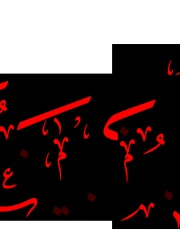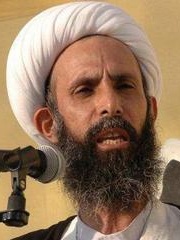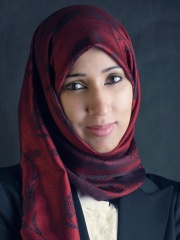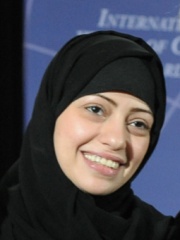





The Most Famous
SOCIAL ACTIVISTS from Saudi Arabia
This page contains a list of the greatest Saudi Arabian Social Activists. The pantheon dataset contains 840 Social Activists, 7 of which were born in Saudi Arabia. This makes Saudi Arabia the birth place of the 30th most number of Social Activists behind Syria, and Czechia.
Top 7
The following people are considered by Pantheon to be the most legendary Saudi Arabian Social Activists of all time. This list of famous Saudi Arabian Social Activists is sorted by HPI (Historical Popularity Index), a metric that aggregates information on a biography's online popularity.

1. Mukhtar al-Thaqafi (622 - 687)
With an HPI of 69.44, Mukhtar al-Thaqafi is the most famous Saudi Arabian Social Activist. His biography has been translated into 28 different languages on wikipedia.
Al-Mukhtar ibn Abi Ubayd al-Thaqafi (Arabic: الْمُخْتَار ٱبْن أَبِي عُبَيْد الثَّقَفِيّ, romanized: al-Mukhtār ibn Abī ʿUbayd al-Thaqafī; c. 622 – 3 April 687) was an Arab pro-Alid revolutionary based in Kufa, who led a rebellion against the Umayyad Caliphate in 685 and ruled over most of Iraq for eighteen months during the Second Fitna. Born in Ta'if, Mukhtar moved to Iraq at a young age and grew up in Kufa. Following the death of Husayn ibn Ali, a grandson of the Islamic prophet Muhammad, at the hands of the Umayyad army in the Battle of Karbala in 680, he allied with the rival caliph Abd Allah ibn al-Zubayr in Mecca, but the alliance was short-lived. Mukhtar returned to Kufa where he declared Muhammad ibn al-Hanafiyya, a son of caliph Ali (r. 656–661) and brother of Husayn, the mahdi and the imam, and called for the establishment of an Alid caliphate and retaliation for Husayn's killing. He took over Kufa in October 685, after expelling its Zubayrid governor, and later ordered the execution of those involved in the killing of Husayn. Hostile relations with Ibn al-Zubayr ultimately led to Mukhtar's death by the forces of the Zubayrid governor of Basra, Mus'ab ibn al-Zubayr, following a four-month siege. Although Mukhtar was defeated, his movement would have far-reaching consequences. After his death, his followers formed a radical Shia sect, later known as the Kaysanites, who developed several novel doctrines and influenced later Shia ideology. Mukhtar raised the social status of mawali (non-Arab local converts to Islam) and they became an important political entity. The mawali and Kaysanites went on to play a significant role in the Abbasid Revolution sixty years later. Mukhtar was important as an early proponent of treating Arab and non-Arab Muslims on an equal footing. He is a controversial figure among Sunnis; condemned by them as a false prophet, but revered by most Shias because of his support for the Alids. Modern historians' views range from regarding him as a sincere revolutionary to an ambitious opportunist.

2. Nimr al-Nimr (1959 - 2016)
With an HPI of 63.51, Nimr al-Nimr is the 2nd most famous Saudi Arabian Social Activist. His biography has been translated into 53 different languages.
Ayatollah Sheikh Nimr Baqir al-Nimr (21 June 1959 – 2 January 2016), commonly referred to as Sheikh Nimr, was a Saudi Shia sheikh from Al-Awamiyah in Saudi Arabia's Eastern Province. His arrest and execution were widely condemned by various governments and human rights organizations. He was popular among youth and critical of the Saudi Arabian government, advocating for free elections in Saudi Arabia. In 2006, al-Nimr was arrested by Saudi authorities, during which he claimed to have been beaten by the Mabahith, a Saudi secret police agency. In 2009, he criticized Saudi authorities and suggested that if the rights of Saudi Shia were not respected, the Eastern Province should secede. In response, Saudi authorities arrested al-Nimr along with 35 others. During the 2011–12 Saudi Arabian protests, al-Nimr urged protestors to resist police bullets with "the roar of the word" rather than violence. The Guardian described al-Nimr as having "taken the lead in [the] uprising." On 8 July 2012, Saudi police shot al-Nimr in the leg and arrested him in what police described as an "exchange of gunfire." During the protests against al-Nimr's arrest, police fired into a crowd of thousands, killing two men, Akbar al-Shakhouri and Mohamed al-Felfel. Following his arrest, al-Nimr began a hunger strike and was allegedly tortured. The Asharq Center for Human Rights expressed concern for his health during the hunger strike on 21 August, calling for international support to allow access for family, lawyers, and human rights activists. On 15 October 2014, al-Nimr was sentenced to death by the Specialized Criminal Court for "seeking foreign meddling in Saudi Arabia, disobeying its rulers, and taking up arms against the security forces." On the same day, his brother, Mohammad al-Nimr, was arrested for tweeting information about the death sentence. Al-Nimr was executed on or shortly before 2 January 2016, along with 46 others. His execution was condemned by Iran and Shiites throughout the Middle East, as well as by Western figures and Sunnis opposed to sectarianism. The Saudi government announced that his body would not be handed over to the family. In March 2017, after a prolonged campaign of harassment, Saudi security forces killed two cousins of the Nimr family during a raid on a farm in eastern Saudi Arabia. Miqdad and Mohammad al-Nimr were killed at a farm in Awamiyah, the Nimr family hometown.

3. Manal al-Sharif (b. 1979)
With an HPI of 52.17, Manal al-Sharif is the 3rd most famous Saudi Arabian Social Activist. Her biography has been translated into 40 different languages.
Manal al-Sharif (Arabic: منال الشريف, romanized: Manāl Aš-Šarīf, pronounced [maˈnaːl aʃːaˈriːf]; born 25 April 1979) is a Saudi women's rights activist who helped start a right-to-drive campaign in 2011. Wajeha al-Huwaider filmed al-Sharif driving a car as part of the campaign. The video was posted on YouTube and Facebook. Al-Sharif was detained on 21 May 2011, released, and rearrested the following day. On 30 May, al-Sharif was released on bail, on the conditions of returning for questioning if required, not driving, and not talking to the media. The New York Times and Associated Press associated the women's driving campaign as part of the Arab Spring and the long duration of al-Sharif's detention due to Saudi authorities' fear of protests. Following her driving campaign, al-Sharif remained an active critic of the Saudi government, tweeting on issues including imprisoned female foreign workers, the lack of elections for the Shura Council, and the murder of Lama al-Ghamdi. Her work has been recognized by Foreign Policy, Time, and the Oslo Freedom Forum.

4. Loujain al-Hathloul (b. 1989)
With an HPI of 49.71, Loujain al-Hathloul is the 4th most famous Saudi Arabian Social Activist. Her biography has been translated into 46 different languages.
Loujain al-Hathloul (Arabic: لجين الهذلول Lujjayn al-Hadhlūl; born 31 July 1989) is a Saudi women's rights activist, social media figure, and political prisoner. She was arrested on several occasions for defying the ban on women driving in Saudi Arabia. In May 2018, she and several prominent women's rights activists were kidnapped in the United Arab Emirates (UAE) and deported to Saudi Arabia where they were charged with "attempting to destabilise the kingdom." Her ex-husband, Saudi stand-up comedian Fahad al-Butairi, was forcibly returned from Jordan to the Kingdom and placed under arrest. For her women's rights activism, Al-Hathloul was awarded the 2019 PEN America /Barbey Freedom to Write Award and the 2020 Václav Havel Human Rights Prize. She was one of Time magazine's "100 Most Influential People of 2019". She was released from prison on 10 February 2021, but lives under a travel ban.

5. Samar Badawi (b. 1981)
With an HPI of 44.59, Samar Badawi is the 5th most famous Saudi Arabian Social Activist. Her biography has been translated into 24 different languages.
Samar bint Muhammad Badawi (Arabic: سمر بدوي; born 28 June 1981) is a Saudi Arabian human rights activist. She and her father filed court cases against each other in Saudi Arabia. Badawi's father accused her of disobedience under the Saudi Arabian male guardianship system and she charged her father with adhl—"making it hard or impossible for a person, especially a woman, to have what she wants, or what's rightfully hers; e.g, her right to marry" according to Islamic jurisprudence—for refusing to allow her to marry. After Badawi missed several trial dates relating to the charge, an arrest warrant was issued for her, and Badawi was imprisoned on 4 April 2010. In July 2010, Jeddah General Court ruled in Samar Badawi's favor, and she was released on 25 October 2010, and her guardianship was transferred to an uncle. There had been a local and international support campaign for her release. The Saudi NGO Human Rights First Society described Badawi's imprisonment as "outrageous illegal detention". Badawi filed a Grievances Board lawsuit against the Ministry of Municipal and Rural affairs for the rejection of her registration for the 2011 municipal elections. She participated in the 2011–2012 women driving campaign by driving regularly since June 2011 and helping women drivers with police and court procedures. In November 2011, she and Manal al-Sharif filed charges in the Grievances Board against the Saudi Arabian General Directorate of Traffic for rejecting their applications for drivers' licences. On 8 March 2012, Badawi was given an award by the United States Department of State for her contributions to women's rights. In 2018, she was arrested by the Saudi authorities again. Canada's request for her immediate release sparked a major diplomatic dispute between Canada and Saudi Arabia.

6. Mozn Hassan (b. 0)
With an HPI of 39.18, Mozn Hassan is the 6th most famous Saudi Arabian Social Activist. Her biography has been translated into 16 different languages.
Mozn Hassan (Arabic: مزن حسن; born 1979) is an Egyptian women's rights campaigner. The founder of Nazra for Feminist Studies, she took part in the protests of the Egyptian revolution of 2011 and worked to help those who were sexually assaulted at the time. Since then she successfully campaigned for changes to be made to the Constitution of Egypt and sexual crime laws to safeguard women. Hassan was awarded the Global Fund for Women’s inaugural Charlotte Bunch Human Rights Award in 2013. She also received the Right Livelihood Awards, known as the "alternative Nobel Peace Prize", in 2016. She is currently subject to a travel ban and asset freeze by the Egyptian government for allegedly violating foreign funding laws.

7. Rahaf Mohammed (b. 2000)
With an HPI of 33.45, Rahaf Mohammed is the 7th most famous Saudi Arabian Social Activist. Her biography has been translated into 19 different languages.
Rahaf Mohammed (formerly Rahaf Mohammed Mutlaq al-Qunun Al-Shammari; Arabic: رهف محمد مطلق القنون الشمري; born 11 March 2000) is a Saudi woman best known for her escape from her Saudi family and her appeals for asylum. She was detained by Thai authorities on 5 January 2019 while in transit through an airport in Bangkok, en route from Kuwait to Australia. She had intended to claim asylum in Australia and escape her family who she says abused her and threatened to kill her for, among other reasons, leaving Islam, an act that is a capital offence under Saudi law. After she appealed for help on Twitter and gained significant attention, Thai authorities abandoned their plans to forcibly return her to Kuwait (from where she would be repatriated to Saudi Arabia), and she was taken under the protection of the United Nations High Commissioner for Refugees and granted refugee status. On 11 January 2019, she was granted asylum in Canada and arrived in Toronto the next day. Since her settlement in Canada, she has written a memoir.
People
Pantheon has 7 people classified as Saudi Arabian social activists born between 622 and 2000. Of these 7, 5 (71.43%) of them are still alive today. The most famous living Saudi Arabian social activists include Manal al-Sharif, Loujain al-Hathloul, and Samar Badawi. The most famous deceased Saudi Arabian social activists include Mukhtar al-Thaqafi, and Nimr al-Nimr. As of April 2024, 1 new Saudi Arabian social activists have been added to Pantheon including Mozn Hassan.
Living Saudi Arabian Social Activists
Go to all RankingsManal al-Sharif
1979 - Present
HPI: 52.17
Loujain al-Hathloul
1989 - Present
HPI: 49.71
Samar Badawi
1981 - Present
HPI: 44.59
Mozn Hassan
HPI: 39.18
Rahaf Mohammed
2000 - Present
HPI: 33.45

